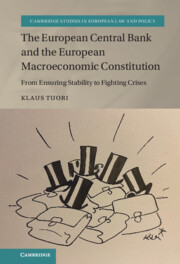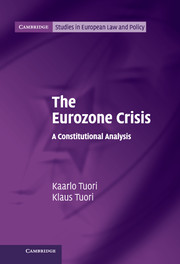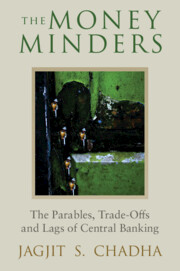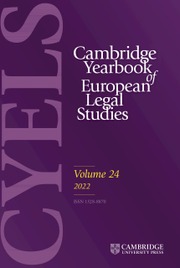The European Central Bank and the European Macroeconomic Constitution
From Ensuring Stability to Fighting Crises
$110.00 USD
Part of Cambridge Studies in European Law and Policy
- Author: Klaus Tuori, Université du Luxembourg
- Date Published: September 2022
- availability: This ISBN is for an eBook version which is distributed on our behalf by a third party.
- format: Adobe eBook Reader
- isbn: 9781108809429
Find out more about Cambridge eBooks
$
110.00 USD
Adobe eBook Reader
Other available formats:
Hardback
Looking for an inspection copy?
This title is not currently available on inspection
-
The book is about money, central banking and constitutions. It explains how the European Central Bank was established to ensure stability and prosperity for the euro area. The ECB was guided and controlled by a coherent European Macroeconomic Constitution. However, this model has failed during recurring crises, and the ECB has started to act as the euro area fire brigade. Consequently, it is pushing the boundaries of monetary policy, and with that challenging the accountability mechanisms and fundamentally also the democratic legitimacy of the EMU. The book sheds light on this complex economic-constitutional setting with a view on the future. The imbalance between various new operations and a single price stability objective is difficult to remedy. New objectives of financial stability, economic adjustment and environmental sustainability can cause fundamental ruptures between the ECB's formal role and its actions, and they also dangerously overburden monetary policy moving forward with substantial risks.
Read more- Builds a coherent European Macroeconomic Constitution on the basis of its philosophical, economic and institutional foundations, showing the reader the main theoretical, economic and legal influences of the European Central Bank and how they interact with economic and constitutional reality
- Assesses the measures of the European Central Bank during a series of crises since 2008 and shows the ruptures in the constitutional model and the ways in which the accountability, legitimacy and the rule of law have been compromised in the process
- Analyses the European Central Bank in the light of recurrent crises and aims to find coherent ways forward through new constitutional objectives
Reviews & endorsements
'Recommended.' M. H. Lesser, Choice
Customer reviews
Not yet reviewed
Be the first to review
Review was not posted due to profanity
×Product details
- Date Published: September 2022
- format: Adobe eBook Reader
- isbn: 9781108809429
- availability: This ISBN is for an eBook version which is distributed on our behalf by a third party.
Table of Contents
1. Introduction – a supranational central bank as a subject
Part I. The ECB as the Central Bank of the European Macroeconomic Constitution:
2. The three foundations of the EMU
3. The principles of the European Macroeconomic Constitution
4. ECB organisation, monetary policy strategy and operational framework
Part II. Crises, ECB Measures and the Macroeconomic Constitution:
5. ECB monetary policy during the financial crisis
6. The prelude to the sovereign debt crisis: events, ECB verbal interventions and EU rescue programmes
7. Selective government bond purchases
8. The ECB's quantitative easing
9. The banking union – the ECB takes over banking supervision
10. ECB measures during the Covid-19 pandemic
Part III. The ECB from a Central Bank of Stability to a Central Bank of Crisis
11. The fate of the European Macroeconomic Constitution
12. The objectives for the ECB and the Macroeconomic Constitution going forward
Epilogue: where do we go from here?.
Sorry, this resource is locked
Please register or sign in to request access. If you are having problems accessing these resources please email [email protected]
Register Sign in» Proceed
You are now leaving the Cambridge University Press website. Your eBook purchase and download will be completed by our partner www.ebooks.com. Please see the permission section of the www.ebooks.com catalogue page for details of the print & copy limits on our eBooks.
Continue ×Are you sure you want to delete your account?
This cannot be undone.
Thank you for your feedback which will help us improve our service.
If you requested a response, we will make sure to get back to you shortly.
×



.jpg)

